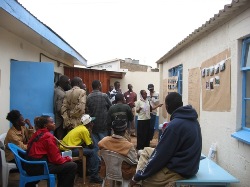 There's nothing like a room full of blank stares to tell you that you have just used the wrong word, nobody there knows what you're talking about and you need to adapt, but what do you do when that word is at the heart of what you do? When that glazed-eye-inducing offender is printed all over your business cards?
There's nothing like a room full of blank stares to tell you that you have just used the wrong word, nobody there knows what you're talking about and you need to adapt, but what do you do when that word is at the heart of what you do? When that glazed-eye-inducing offender is printed all over your business cards?
Erik, Kabi, Edwin and I are in a meeting hall in Kibera, a shanty town in Nairobi, Kenya which, with an estimated one million people, is one of Africa's, if not the world's, largest slums. We're running the second of four community engagement workshops in which we are preparing local community groups, entrepreneurs and social enterprises, on how to best approach and prepare for a partnership with multinational companies; in this case, how to partner with our main corporate sponsor, SC Johnson. This is what we do, we bring people from diverse backgrounds and with diverse resources together, "a creative collision of world views", to create new market opportunities for multinationals and locally grown businesses for poor communities via a process of "mutual value creation". Buzz phrase laden work, yes, but it's actually all been going quite well so far, except that now our community partners are stuck on our name. Behind us, on a brown flip chart taped to the wall, is drawn a large three sided figure, a triangle really, with the words "Base of the Pyramid" written on top, or BoP for short. That's us.